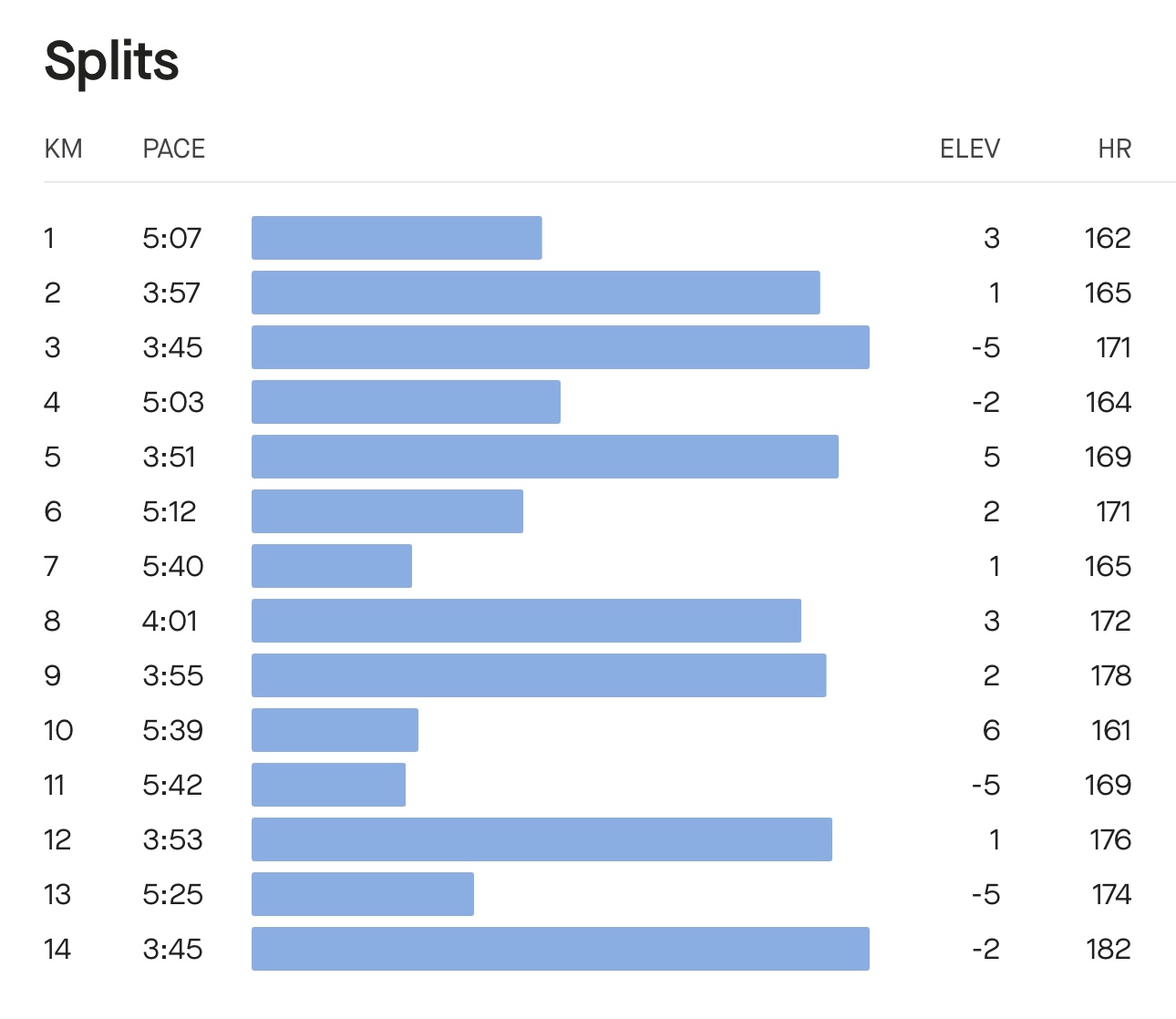Week 12: Embracing Easy Runs.
March 24, 2024
Tuesday - 10km Recovery
Today I opted for a recovery run instead of my usual easy run because I had not fully recovered from my efforts on Sunday.
This was surprisingly enjoyable for a recovery run. My average pace was 6:49/km, and my heart rate barely went above 140.
Not long ago I heard of the idea of doing easy runs with a bouncy ball as a way to occupy yourself. Throwing it up in the air, letting it bounce, and picking it up again––it doesn't sound fun but I found it entertaining, especially when running with a friend because we were passing it around to each other.
Runs like these remind me that sometimes even my easy runs are too hard. If you have to question whether you're running too hard for an easy run, you probably are.
Running, I've noticed, benefits from the barbell strategy.
If you think about a barbell: weights on either end, and a slim bar in the middle. Think of the whole bar (with the weights) as the x-axis measuring the difficulty of each run––on the left you have the easy runs, and on the right side you have you harder, high intensity runs. The y-axis becomes the frequency of each run.

Following the barbell strategy, your runs would consist mostly of easy runs and hard runs, with very little medium-intensity runs. This is what I try to implement in my training.
Wednesday - 8km Easy
Today was a different run for me––I went to an event hosted by On Running where I was able to run in a pair of the Cloudeclipse, which I have been eyeing off to buy for my easy long runs.
I ran in the 5:00 pace group. It was such a strange feeling to run with so many people without it being for a race, and exciting to run through different scenery in the city.
After the run, everyone gathered again at the Osborne Rooftop for food and drinks. For a free event, I can't complain after taking some new shoes for a test run and being given food and drinks. And of course, it was nice to meet new people with similar running goals.
Friday - 14km Interval Workout
Workout Splits:

That was a very tough workout.
Pushed myself hard today. I was not expecting to do 7km of hard work, but I was feeling good so I went for it.
I'm gonna be honest, I went into this run without a specific plan for my intervals and just made up the workout as I went. I knew I wanted to do at least 6km of work, with at least one 2km segment. The rest was just improvised. I guess it went alright.
All my hard efforts were faster than 4:00/km pace, except for one that was at 4:01. These segments started around 8/10 effort, and then picked up to close to maximum effort for the last few splits, especially the final kilometre send.
I've learnt that it's okay to take a minute or so between sections in a run to catch your breath, so today I walked for about a minute after my second 2km fast block just to catch my breath before resuming with 2km of easy running. I find doing this to be helpful so I can put more effort into the hard sections by making sure I've recovered properly in the short time between sets.
Overall this was a solid workout and it's made me realise how much I've missed running fast.
Saturday - 8km Recovery
I took this run really easy, knowing I have a tendency to go too fast on these kinds of runs. This was especially important because I'm still recovering from yesterday's workout, and I want to be feeling good for tomorrow's long run.
Got the 8km in, with an average pace of 6:07/km, and an average heart rate of 149.
Sunday - 23km Easy/Long
I'm starting to realise I might have been going too hard in my longs runs until now. At least they should not all be as intense as they are.
Felt like I needed some rest today, so I didn't go with my usual long run strategy of progressive pace increases and high intensity. I tried to keep the pace around 5:15/km, but adjusted as necessary if I felt my heart rate was getting too high. I couldn't help myself and caved into my boredom by sending it for the last 2.5km.
As boring as this run was, these kinds of runs are important because in addition to running 23km, I also clocked up 2 hours on my feet (which surprisingly makes my longest duration run to date). I plan to include more easier long runs in my training because they're a good way to get more time on my feet, which for someone in my position of training for their first marathon, is very important.
Running easier is also helpful when I'm increasing the distance of my long runs. For example, when I run 25km for the first time, it would make a lot more sense if I do this at an easier pace rather than trying to go hard.
I'm not denying the importance of intense long runs or long run workouts. Each type of run has its time and place. Moving forwards, I'm going to experiment with some kind of weekly rotation of easy and hard long runs.
At the end of the day, that's all this marathon training block is for me––an experiment for me to see how much my body can handle, and what kind of training works for me.
Weekly Summary:
Total Distance: 63km
15 Weeks Out.